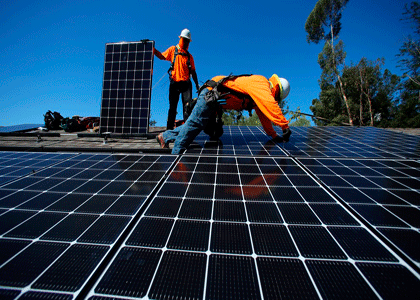Solar panel glass replacement
Label:
Solar panel
The glass on the solar panel is a kind of low-iron tempered glass, also known as white glass. The common thickness is about 3.2 mm. The light transmittance is more than 90% in the wavelength range of the solar cell spectral response (320-1100NM). The infrared light has a high reflectivity. Solar panel glass has the advantages of being resistant to ultraviolet radiation and ensuring that the light transmittance does not decrease.
The tempered properties of the solar panel glass need to meet the national standard GB9963-88, and the impact resistance of the packaged components must meet the performance indicators specified in the national standard GB9535-88 ground silicon solar cell environmental test method before they can be put into use.
Because the solar cell module is formed by laminating 5 layers, the surface glass and the original sheet of the module are bonded together by EVA. EVA is a hot melt adhesive with a thickness between 0.4 mm and 0.6 mm. Uniform, containing cross-linking agent. EVA is non-tacky and anti-adhesive at room temperature. After a certain adjustment of heating and pressure, fused bonding and cross-linking and curing occur, and it becomes completely transparent.
The cured EVA can withstand atmospheric changes and has elasticity. It will "upper cover and lower pad" the cell sheet, encapsulate it, and the upper protective material glass, the lower protective material backplane (TPT, BBF, etc.), using the vacuum Compression technology is integrated. On the other hand, it can improve the light transmittance of the glass after being bonded with the glass, play a role of enhancing the transparency, and have a gaining effect on the output of the solar panel. The original solar panel is very thin, so if you just take out the glass, it is easy to break the fragile battery.
